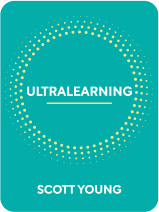

This article is an excerpt from the Shortform book guide to "Ultralearning" by Scott Young. Shortform has the world's best summaries and analyses of books you should be reading.
Like this article? Sign up for a free trial here .
What is memory retrieval? Why don’t traditional study methods work as well as self-testing?
Memory retrieval is the process of recalling information that you’ve stored in your memory. The best way to store information long-term is through self-testing. Although reading and memorizing may seem like an effective way to study, the results are only short-term.
Continue on to learn more about how self-testing helps improve memory retrieval.
What Is Memory Retrieval?
Long-term proficiency is only possible if you are able to retrieve the information you learn. Memory retrieval is the process of recalling information we’ve stored in our memory. Typically we use the traditional study method (reviewing existing material) to retrieve learned information. However, research shows that testing yourself from memory alone (also known as self-testing) is the study method that best serves retention (the long-term storing of information). The purpose of self-testing is to efficiently maximize the amount of information you’re able to retrieve.
Why Do So Many Prefer Traditional Studying?
Though self-testing is the most effective way to study, many still choose the traditional reviewing of material instead. Research indicates this is because we develop a perception of our learning progress by getting feedback from the study process. If the process feels easy, we think we’re doing well. If it’s not easy, we feel the opposite. Students often choose passive review because they aren’t confident in their ability to recall on their own. When you review information passively, it’s easy to recall it right afterward, giving you the impression you’ve learned it. However, on the day of the actual test, you’ll likely recall far less than expected.
Benefits of Self-Testing
Self-testing is the most direct way to learn the information as long as it is the closest replication of the environment it will be used in. Self-testing is also effective because by asking yourself questions and checking your answers afterward, you give yourself feedback.
Traditionally, you test to evaluate how well you understand what you’re currently learning. The concept of memory retrieval, however, indicates that tests can be used to improve future learning. Research shows it’s easier to learn new information when you are in the habit of testing yourself on the information you’ve studied previously. In other words, practicing retrieval through self-testing makes you a better learner before you even have new material to test (this is called the forward testing effect) and helps you develop learning methods that integrate automatically when you come across old information again.
How Can You Maximize Your Study Results?
An important tool influencing memory retrieval is delay, which improves retention. You are more likely to retain information if you give yourself some time between study and active recall. The reason for this is that answers are a little more difficult to recall after a small delay, and this added challenge improves learning retention. Keep in mind the following rules:
- Low-intensity learning = easier to recall info, low retention rate
- High-intensity learning = harder to recall info, high retention rate
- Too much delay = forgotten knowledge
You want memory retrieval to be challenging but not so difficult that you can’t access the information at all. Experiment until you find the middle ground and use directness to train yourself to identify the information most necessary to your overall learning goal. For example, if you’re studying Spanish, and you need to speak in full sentences, memorize vocabulary. Without that need, vocabulary might not be the priority.
What Are the Best Ways to Self-Test?
There are five effective methods for self-testing.
Method 1: Flash Cards
Use visual association cues for learned information. This works best for pairings between a straightforward association and response (for example, if you’re learning basic medical terminology). However, when you try to use flashcards to remember something too complex, this limits the method. For example, it’s useful to make flashcards for memorizing vocabulary for a new language or the periodic table of elements. It’s less useful to make flashcards for complex concepts like quantum theory.
Method 2: Free Recall
After you study a piece of information, practice writing down as much as you can recall in a notebook. Free recall is challenging, so you won’t remember as much as you want, but forcing yourself to try makes that information easier to recall later.
Method 3: Questions
Instead of taking notes in the traditional way, reconstruct what you want to write into targeted questions to test yourself on later. This allows you to create methods for later retrieval while studying the information you will want to recall. For example, instead of writing, “Obama became president in 2008,” write, “Who became president in 2008?”
The one caveat is that not all questions will be useful. Only write questions that encapsulate the main principles or ideas of a subject or section of information. This encourages deeper thinking. To deepen and focus the process further, challenge yourself to write only one question per section of information studied. This trains you to focus on the most important information.
Method 4: Personal Challenge
If what you’re learning is complex or you need to practice a skill, upgrade the previous method by creating “challenges” to solve. For example, if you’re learning survival skills, you might set up outdoor activities that mimic the conditions of the skills you’re learning (like starting a fire with sticks from your yard or making a shelter). A long list of challenges gives you methods for later practice and study because resolving the challenges strengthens your retrieval capacity.
Method 5: Blind Retrieval
When you’re self-testing, don’t allow yourself to search for hints on what you’re learning. This reduces your reliance on looking up information, and helps develop your mental reference book. For example, if you’re studying anatomy, don’t allow yourself to look at the textbook or source material at any point during the testing process.

———End of Preview———
Like what you just read? Read the rest of the world's best book summary and analysis of Scott Young's "Ultralearning" at Shortform .
Here's what you'll find in our full Ultralearning summary :
- How a formal education doesn’t open the doors it once could
- The 9 core principles that can help you master any skill
- How to create a self-directed learning project to help you advance in your field






